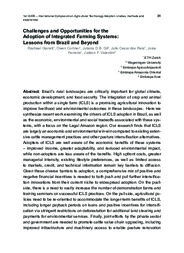Challenges and opportunities for the adoption of integrated farming systems: lessons from Brazil and beyond.
Challenges and opportunities for the adoption of integrated farming systems: lessons from Brazil and beyond.
Autoria: GARRETT, R.; CORTNER, O.; GIL, J. D. B.; REIS, J. C. dos; FERREIRA, J. N.; VALENTIM, J. F.
Resumo: Brazil's rural landscapes are critically important for global climate, economic development, and food security. The integration of crop and animal production within a single farm (ICLS) is a promising agricultural innovation to improve livelihood and environmental outcomes in these landscapes. Here we synthesize recent work examining the drivers of ICLS adoption in Brazil, as well as the economic, environmental and social tradeoffs associated with these systems, with a focus on the Legal Amazon region. Our research finds that ICLS are largely an economic and environmental win-win compared to existing extensive cattle management practices and other pasture intensification alternatives. Adopters of ICLS are well aware of the economic benefits of these systems - improved income, greater adaptability, and reduced environmental impact, while non-adopters are less aware of the benefits. High upfront costs, greater managerial intensity, existing lifestyle preferences, as well as limited access to markets, credit, and technical information remain key barriers to diffusion. Given these diverse barriers to adoption, a comprehensive mix of positive and negative financial incentives is needed to both push and pull further intensification innovations from their current niche to widespread adoption. On the push side, there is a need to vastly increase the number of demonstration farms and training seminars on successful ICLS practices. On the pull side, agricultural policies need to be re-oriented to accommodate the longer-term benefits of ICLS, including longer payback periods on loans and positive incentives for intensification via stringent restrictions on deforestation for additional land clearing and payments for environmental services. Finally, joint efforts by the private sector and government are needed to promote cattle value chain upgrading, including improved infrastructure and machinery access to enable pasture renovation and crop production in more remote regions, and better transparency about cattle origin and management practices to signal the sustainability of the sector.
Ano de publicação: 2020
Tipo de publicação: Artigo em anais e proceedings
Unidade: Embrapa Agrossilvipastoril
Observações
1 - Por padrão são exibidas publicações dos últimos 20 anos. Para encontrar publicações mais antigas, configure o filtro ano de publicação, colocando o ano a partir do qual você deseja encontrar publicações. O filtro está na coluna da esquerda na busca acima.
2 - Para ler algumas publicações da Embrapa (apenas as que estão em formato ePub), é necessário ter, no celular ou computador, um desses softwares gratuitos. Sistemas Android: Google Play Livros; IOS: iBooks; Windows e Linux: software Calibre.
Acesse outras publicações
Acesse a Base de Dados da Pesquisa Agropecuária (BDPA) para consultar o acervo completo das bibliotecas da Embrapa.

